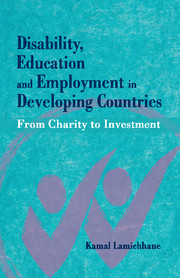Book contents
- Frontmatter
- Contents
- List of Tables and Figures
- Preface
- Acknowledgements
- 1 Fundamentals of Disability Studies
- 2 Disability and the Global Employment Situation
- 3 Disability and the Role of Education in Jobs: Case Studies from Nepal and the Philippines
- 4 Disability and Jobs in a Post-Conflict Country: Cambodia
- 5 Gender and Jobs: A Comparison between People with and without Disabilities in Bangladesh
- 6 Disability and Human Capital Investment
- 7 Disability, Poverty and Inequality: A Case Study in Nepal
- 8 Disability and Job Satisfaction Differentials
- 9 Disability and Determinants of Education: A Case from India
- 10 Disability and Barriers to Education
- 11 The Way Forward: Investment in Disability
- Index
- About the Author
3 - Disability and the Role of Education in Jobs: Case Studies from Nepal and the Philippines
Published online by Cambridge University Press: 05 February 2015
- Frontmatter
- Contents
- List of Tables and Figures
- Preface
- Acknowledgements
- 1 Fundamentals of Disability Studies
- 2 Disability and the Global Employment Situation
- 3 Disability and the Role of Education in Jobs: Case Studies from Nepal and the Philippines
- 4 Disability and Jobs in a Post-Conflict Country: Cambodia
- 5 Gender and Jobs: A Comparison between People with and without Disabilities in Bangladesh
- 6 Disability and Human Capital Investment
- 7 Disability, Poverty and Inequality: A Case Study in Nepal
- 8 Disability and Job Satisfaction Differentials
- 9 Disability and Determinants of Education: A Case from India
- 10 Disability and Barriers to Education
- 11 The Way Forward: Investment in Disability
- Index
- About the Author
Summary
Introduction
Emerging evidence has shown that low levels of education lead people with disabilities in developing countries into a vicious cycle of poverty (Filmer 2008; WHO and World Bank 2011). On the other hand, it is commonly understood that high-quality education provides for personal growth and increases the chances of gainful employment and higher wages, thus providing an avenue out of poverty. The situation is further exacerbated in the case of people with disabilities as mainstream schooling systems in developing countries are generally poorly equipped to meet their needs.
Within this context, this chapter aims to deepen the understanding of the effect of education on the employability and occupational choices of people with disabilities through an analysis of Nepal and the Philippines. Education plays a crucial role not only in increasing their employability generally but also in improving their occupational options, for example, the opportunity to obtain white-collar or full-time jobs. Education also allows people with disabilities to learn important life skills that enable them to function more independently in mainstream society. Through the process of education, people with disabilities are able to identify their strengths and gain self-confidence.
However, in many developing countries, when considering the situation of people with disabilities, this common knowledge is not widely credited. The prevailing belief is still that, even if people with disabilities are educated, they are less likely to make use of their education, or they will not be useful in the workforce. One of the major obstacles to challenging this notion is the lack of credible data and the limited number of evidence-based studies on disability and the relationship between education and labour market participation. Without relevant and accurate disability statistics, research on these issues cannot be effectively undertaken.
This chapter aims to fill this gap by making comparisons across employment based on the type of impairments and education levels, so as to identify and explain variations in employability and occupational choice differentials. Looking at individuals with hearing, physical and visual impairments, and this research is one step towards improving the employment situation of people with disabilities in Nepal and the Philippines.
- Type
- Chapter
- Information
- Disability, Education and Employment in Developing CountriesFrom Charity to Investment, pp. 38 - 65Publisher: Cambridge University PressPrint publication year: 2015



